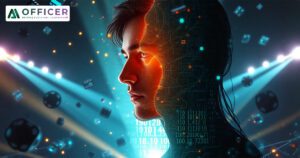
Meta, the company behind Facebook, is pushing the boundaries with its AI models, and the question on everyone’s lips is : can these models become true collaborators in the realms of art and film?
The implications are staggering. Imagine a future where an AI assistant doesn’t just generate generic images or scripts, but actively engages with the human creative process, offering novel ideas, unique perspectives and even emotional resonance. This is the promise that lies ahead and it’s a future that is closer than you might think.
Recent advancements in generative AI, spearheaded by the likes of Meta’s cutting-edge language models, have demonstrated an uncanny ability to understand and generate human-like text, images and even audio. But the true test lies in whether these models can transcend their role as mere tools and become true collaborators in the creative arts.
Teaching AI the nuances of human creativity is no small feat. Art is subjective, emotional, and often defies rigid rules. Can we truly encode these qualities into algorithms?
This is where AI Officer comes in. We are a team of AI consultants passionate about helping businesses leverage the power of artificial intelligence. We understand the technical complexities of AI models, but we also recognize the importance of human-centric design.
So, how can Meta’s AI models be used for artistic collaboration? Here are a few ideas –
- Concept Generation : Struggling for inspiration? Feed your initial ideas into an AI model and let it generate variations, unexpected combinations and entirely new concepts based on your style.
- Style transfer : Imagine taking a Van Gogh-inspired filter and applying it not just to photos, but to entire films or animations. AI could help artists seamlessly blend styles and create unique visual experiences.
- Interactive storytelling : AI could power dynamic narratives that adapt to audience choices, creating a truly immersive and personalized experience.
Challenges and considerations –
- Bias in AI models : AI models are only as good as the data they’re trained on. Ensuring diverse and inclusive datasets is crucial to avoid biased outputs in artistic creation.
- The human touch : While AI can be a powerful tool, it shouldn’t replace the human artist altogether. The collaboration between human creativity and AI’s computational power is what holds the most promise.
Meta’s advancements in AI models are just the beginning. As AI technology continues to evolve, the possibilities for artistic collaboration are truly limitless. Imagine AI composing music that perfectly complements your film score, or generating personalized poems based on your emotions.
This rapid evolution of AI has implications for every industry, not just art and film. How will AI impact your business? Are you prepared to leverage its power?
Stay tuned for our upcoming blog posts where we’ll delve deeper into the applications of AI across various sectors.
Get in touch with our AI officers for a customized consultation.
We can help you identify the right AI tools and develop a strategy for integrating them into your workflow.
AI Officer can be your partner in navigating the exciting and sometimes daunting world of artificial intelligence. Let’s explore the possibilities together.





